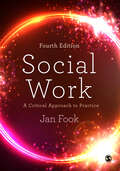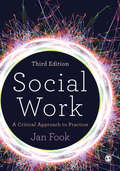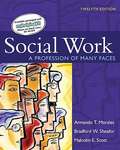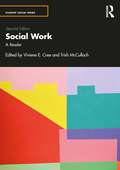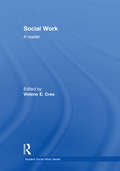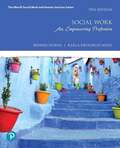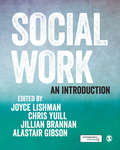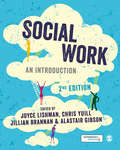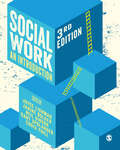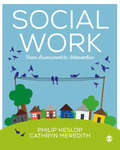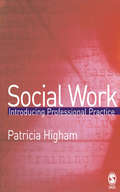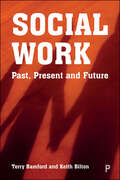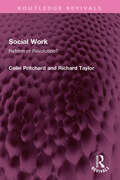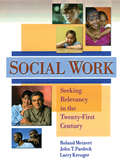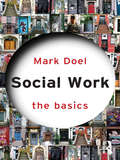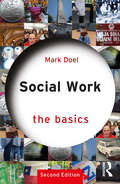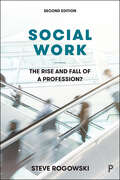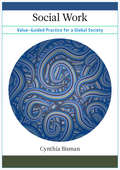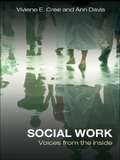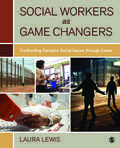- Table View
- List View
Social Work: A Critical Approach to Practice
by Jan FookNow 20 years since its first publication, Jan Fook returns to update her seminal text. Celebrating the ageless ideals of the profession, this book throws a life belt to all social work students and professionals looking to engage with the critical tradition of social work to improve their understanding and practice. Part One: Critical Potential and Current Challenges sets the historical and current contexts for critical social work, introducing you to what critical social work is and what it means for practice. Part Two: Rethinking Ideas unpicks the major concepts associated with critical social work, including knowledge, power, discourse, identity, and difference, and how these need to be rethought in new contexts. Part Three: Redeveloping Practices illustrates how these new ideas can inform new practices, proving you with all the tools you need to deliver flexible, responsible and responsive social work practice.
Social Work: A Critical Approach to Practice
by Jan FookNow 20 years since its first publication, Jan Fook returns to update her seminal text. Celebrating the ageless ideals of the profession, this book throws a life belt to all social work students and professionals looking to engage with the critical tradition of social work to improve their understanding and practice. Part One: Critical Potential and Current Challenges sets the historical and current contexts for critical social work, introducing you to what critical social work is and what it means for practice. Part Two: Rethinking Ideas unpicks the major concepts associated with critical social work, including knowledge, power, discourse, identity, and difference, and how these need to be rethought in new contexts. Part Three: Redeveloping Practices illustrates how these new ideas can inform new practices, proving you with all the tools you need to deliver flexible, responsible and responsive social work practice.
Social Work: A Critical Approach to Practice
by Professor Jan FookSocial work is a human profession founded on social justice. It is difficult, however, to negotiate this in the constantly changing context of the 21st century. Drawing on her own experiences and the experiences of others, Jan Fook returns to address the critical tradition of social work, supporting students in their understanding of the possibilities of critical practices in changing contexts. Part One: Critical Potential and Current Challenges sets the historical and current contexts for critical social work, introducing students to what critical social work is and what it means for practice. Part Two: Rethinking Ideas unpicks the major concepts associated with critical social work, including knowledge, power, discourse, identity, and difference, and how these need to be rethought in new contexts. Part Three: Redeveloping Practices illustrates how these new ideas can inform new practices, proving students with all the tools you need to deliver flexible, responsible and responsive social work practice. Celebrating the ageless ideals of the profession, this book throws a life belt to all social work students and professionals looking to engage with the critical tradition of social work to improve their understanding and practice. Jan Fook is Visiting Professor of Professional Practice Research, Royal Holloway, University of London and Chair in Education (Critical Reflection), Kingston University and St Georges, University of London
Social Work: A Profession of Many Faces
by Armando Morales Bradford Sheafor Malcolm ScottThis best-selling text continues to offer a comprehensive introduction to the field of social work with a unique focus on the diverse groups to whom social workers provide services; including children, older adults, disabled persons, and members of minority racial and ethnic groups. <P><P>It covers the emergence of the profession of social work, career oportunities for social workers, and the values and competencies required of social workers. <P><P>Timely issues that this edition addresses include the following: the events of 9/11 and their dramatic influence on human services in the United States; the United States involvement in Middle East warfare; the physical and emotional damage to individuals involved in Middle East warfare; and the 2000 Census---how substantial changes in the U.S. population suggest a need for realignment of social services.
Social Work: A Reader (Student Social Work)
by Viviene E. Cree Trish McCullochBuilding on the successful 1st edition, this reader brings together some of the most significant ideas that have informed social work practice over the last fifty years. At the same time as presenting these foundational extracts, the book includes commentaries that allow the reader to understand the selected extracts on their own terms as well as to be aware of their relations to each other and to the wider social work context. There is no settled view or easy consensus about what social work is and should be, and the ideas reflected in this volume are themselves diverse and complex. The world of social work has changed greatly over the last ten years, and this new edition reflects that change with new material on the decolonisation of social work knowledges, the greater emphasis on inter-disciplinarity and co-production and the new concern for identities. With an accessible introduction to contextualise the selections, the book is divided into three main sections, each presenting key texts drawn from a wide range of perspectives: psychological, sociological, philosophical, educational and political, as well as perspectives that are grounded in the experiences of practitioners and those who use services, which have contributed to the development of: • the profession of social work, • knowledge and values for social work and• practice in social work. By providing students and practitioners with an easy way into reading first-hand some of the most interesting, foundational texts of the subject, it will be required reading for all undergraduate and postgraduate programmes and professionals undertaking post-qualifying training.
Social Work: A Reader (Student Social Work)
by Viviene E. CreeWhat are the key ideas that underpin social work practice? This inspiring Reader brings together some of the most significant ideas which have informed social work practice over the last forty years. Exploring these fundamental ideas, the book includes commentaries that allow the reader to understand the texts on their own terms as well as to be aware of their relations to each other and to the wider social work context. An accessible introduction contextualises the reader, summarising the main themes and highlighting key issues. The book is then divided into three main sections, each presenting key texts which have contributed to the development of: the profession of social work social work knowledge and values social work skills and practice. There is no settled view or easy consensus about what social work is and should be, and the ideas reflected in this volume are themselves diverse and complex. The contributions are drawn from a wide range of perspectives: psychological, sociological, philosophical, educational and political, as well as perspectives which are grounded in the experiences of practitioners and those who use services. This important resource is essential reading for all social work students.
Social Work: An Empowering Profession
by Brenda Dubois Karla MileyWith its strengths and empowerment approach, Social Work: An Empowering Profession, 7 explores contemporary themes such as diversity and social justice and integrates the Council on Social Work Education's core competencies throughout. Each chapter reflects and integrates the core competencies in the 2008 Educational Policy and Accreditation Standards (EPAS) set by the Council on Social Work Education (CSWE). End-of-chapter assessment reinforces this integration, and MySocialWorkLab.com activities support the mastery of CSWE's core competencies.
Social Work: An Introduction
by Alastair Gibson Chris Yuill Jillian Brannan Joyce LishmanSocial Work: A Introduction is designed to help your students make the best start in their academic and professional careers. Mapped throughout to the most up-to-date professional standards, the book covers the full range of knowledge and skills students need to gain in the early stages of their social work course and as they prepare to go out on placement. Key Learning Features: Key Themes and Chapter Introductions - to set the scene and place each chapter in context. Case Studies and Practice Vignettes - illustrate how theory, knowledge and policy translate to real-life practice. Also help students consider the service-user's experience and develop a holistic approach to care. Exercises, Activities and Reflective Questions - independent learning tasks to help students apply theory to their practice, and to develop their skills of critical reflection Critical Thinking Boxes - support your students in their journey towards becoming critically reflexive practitioners. Visit the companion website to access a range of resources to support both lecturers and students, including: Vodcasts and podcasts from students, lecturers, service users and authors to introduce key topics to audio and visual learners Activities and case studies from different fields and settings to show how theory translates into real life practice Selected SAGE journal articles to help take learning to the next level Up-to-date links to codes of ethics, frameworks and other useful resources.
Social Work: An Introduction
by Alastair Gibson Chris Yuill Professor Joyce Lishman Jillian BrannanHelp your students make the best starts in their careers as a Social Worker. Covering everything they need to know in their first year and beyond, this very practical book will guide them through their degree and into practice. Packed full of case studies, activities and tools for real-life practice, it will: Help students get to grips with and build the essential knowledge and skills base Support them to develop a range of tools for practice with different service user groups Develop their critical thinking and help them to apply their learning in practice Provide them with a springboard for further learning and development. To get the most out of this book and access more materials to support them throughout their degree, they can visit the companion website at https://study.sagepub.com/lishman2e
Social Work: An Introduction
by Alastair Gibson Chris Yuill Professor Joyce Lishman Jillian BrannanHelp your students make the best starts in their careers as a Social Worker. Covering everything they need to know in their first year and beyond, this very practical book will guide them through their degree and into practice. Packed full of case studies, activities and tools for real-life practice, it will: Help students get to grips with and build the essential knowledge and skills base Support them to develop a range of tools for practice with different service user groups Develop their critical thinking and help them to apply their learning in practice Provide them with a springboard for further learning and development. To get the most out of this book and access more materials to support them throughout their degree, they can visit the companion website at https://study.sagepub.com/lishman2e
Social Work: An Introduction
by Chris Yuill Joyce Lishman Gary Spolander Janine Bolger Neil GibsonNow in its third edition, Social Work: An Introduction will equip you, as a future social worker, with everything you need to know in your first year and beyond. Split into four parts, each chapter is packed with learning features to allow you to get the most out of your reading and studies. This book includes: - Case studies and exercises to illustrate and test your knowledge - Critical thinking boxes and reflective questions to help you carefully consider and review what you have learned - Recommended reading to further develop your understanding - A range of tools for practice with different service user groups - Guidance on relating your knowledge to different practice frameworks throughout the UK. Plus free online resources to support teaching: find themes for discussion, SAGE journal articles, case studies, activities, and more at https://study.sagepub.com/lishman-et-al3e.
Social Work: An Introduction
by Chris Yuill Joyce Lishman Gary Spolander Janine Bolger Neil GibsonNow in its third edition, Social Work: An Introduction will equip you, as a future social worker, with everything you need to know in your first year and beyond. Split into four parts, each chapter is packed with learning features to allow you to get the most out of your reading and studies. This book includes: - Case studies and exercises to illustrate and test your knowledge - Critical thinking boxes and reflective questions to help you carefully consider and review what you have learned - Recommended reading to further develop your understanding - A range of tools for practice with different service user groups - Guidance on relating your knowledge to different practice frameworks throughout the UK. Plus free online resources to support teaching: find themes for discussion, SAGE journal articles, case studies, activities, and more at https://study.sagepub.com/lishman-et-al3e.
Social Work: From Assessment to Intervention
by Philip Heslop Cathryn MeredithThis book equips readers with the essential knowledge and skills to undertake effective assessments and appropriate interventions with confidence. In part one the authors unpick exactly what assessment is, outline the assessment toolkit, apply this to practice and discuss the ins and outs of the development of a clear care plan. Drawing on activities, case studies and service user perspectives part two guides readers through the application of different intervention methods in varied contexts with diverse service user groups. This book focuses on key issues such as resilience, professional values and ethics, complexity and reflective practice, helping students not only get to grips with all the essential theory but also to develop to emotional and professional intelligence.
Social Work: From Assessment to Intervention
by Philip Heslop Cathryn MeredithThis book equips readers with the essential knowledge and skills to undertake effective assessments and appropriate interventions with confidence. In part one the authors unpick exactly what assessment is, outline the assessment toolkit, apply this to practice and discuss the ins and outs of the development of a clear care plan. Drawing on activities, case studies and service user perspectives part two guides readers through the application of different intervention methods in varied contexts with diverse service user groups. This book focuses on key issues such as resilience, professional values and ethics, complexity and reflective practice, helping students not only get to grips with all the essential theory but also to develop to emotional and professional intelligence.
Social Work: Introducing Professional Practice
by Dr Patricia E Higham'Comprehensive and user-friendly. The book is helpfully constructed around a number of key themes, starting with a good attempt to define social work from historical and international perspectives and moving on to address key issues concerning the practice, knowledge, values and skills required from contemporary social work in the UK. I believe social work students, newly qualified and experienced social workers will find ths a valuable resource, especially when one is confronted by challenges in practice' - Professional Social Work 'Social Work is a good overview that should refresh learner and tutor alike. Pratice assessors may find this book a useful update for their work with students and also a neat refresher. It is a well-written and up-to-date text, with a good sense of where future challenges lie for the social work profession in the UK. Higham is confident enough to voice the profession's uncertainties as well as mapping the changing organisational landscape that social workers might populate. [This book] is likely to appear on many social work reading lists. [It has] the potential to provide good learning opportunities for post-qualifying as well as pre-qualifying training' - Health and Social Care in the Community `The unique aspect of this book which distinguishes it from other competitors is that it is constructed explicitly around the key roles and benchmark statements... this book will offer something new and interesting to the growing field of social work education literature and is likely to be relevant to both students and practitioners in the UK and elsewhere' - Dr Caroline Skehill, Queens University Belfast What is the role of social work? What does it mean to be a social worker? What are the changes affecting social work training? Social Work: Introducing Professional Practice addresses these questions and provides an understanding of the knowledge, values, and skills requirements of professional social work. The author has played a key role in constructing the subject benchmarks for the social work degree and offers a reflective and thoughtful commentary upon training, education and practice. Written in a lively and readable style, the book captures the essence of the changes sweeping through social work and engages the reader in these debates. Key features of this book include: - Comprehensive content structured around the guidelines for training and practice - Bridges the gap between theory and real-life practice - Student-friendly features such as case-studies, discussion questions, further reading and a glossary This exciting publication will be a core textbook for trainee social workers as they progress through the qualifying social work degree, or as they begin their practice as newly qualified workers seeking to consolidate their learning.
Social Work: Past, Present and Future
by Terry Bamford and Keith BiltonThis collection charts the key developments in the social work field from 1970 to the present day and shows how by fully understanding social work’s past, we can make better progress for practitioners and service users in the future. It brings together a broad collection of experts from across social work who trace how thinking and approaches to practice have changed over time, examine key legislative developments in the field, look at the impacts of major inquiries and consider the re-emergence of certain specialisms. Providing students and practitioners of social work and social policy with a full picture of the evolution of social work, it also shares important insights for its future directions.
Social Work: Reform or Revolution? (Routledge Revivals)
by Richard Taylor Colin PritchardFirst published in 1978, Social Work is concerned with relating social methods and objectives to political ideology. Social work grew out of the fertile tradition of mainstream Liberal radicalism in the nineteenth century, and to appreciate its largely implicit contemporary value framework it is essential to analyse the ideologies of ‘Conservatism’ and ‘social democracy’ which have dominated Britain in the twentieth century. The links between social work methods and aspirations and political ideology are thus explored in some detail. A key argument which closely involves social work relates to the potential for social change within the existing institutional structures. The question of ‘Legitimation’ is thoroughly examined in this context from all viewpoints, and the conclusions for social work development are discussed. This book will be of interest to students of social work, sociology and political science.
Social Work: Seeking Relevancy in the Twenty-First Century
by Jean A Pardeck Roland Meinert Larry W KreugerDiscover why social work must be restructured if it is to remain viable!Social Work: Seeking Relevancy in the Twenty-First Century provides you with a critical examination of the major issues that social work education and practice must confront if social work is to remain as a mainline profession. The book explores issues that are not normally covered in social work literature, such as the challenge of reconstructing the social work profession, the use of technology in social work, and the tension surrounding various social work education curriculums. You will benefit from this thorough discussion of the many problems that the social work profession is facing: a lack of scholarly research, inadequate educational programs, and the use of hypertechnology to educate social work students.Social Work: Seeking Relevancy in the Twenty-First Century examines the epistemological, theoretical, socio/technical, and practice directions that social work has branched into. You'll discover that today's central direction for social work is generated from liberal, postmodern, and increasingly feminist ideological perspectives. In a field where conceptual and theoretical input rarely allow for intellectual diversity, this volume demonstrates that several views are best for inquiry and exploration in social work.Issues discussed include: examining real or unreal social work values by separating them from beliefs, preferences, norms, attitudes, and opinions creating social work course outlines that incorporate practices developed around the globe, allowing for more conceptual and theoretical growth within the field realizing the tremendous difference between communication in the instrumental sense via technology, and in the affective, soul-oriented sense via personal interaction investigating the negative effects of communicating with hypertechnology (modems, e-mail) in the social work profession realizing the need for a greater quantity and quality of social work research to progress further in the fieldSocial Work: Seeking Relevancy in the Twenty-First Century invites you to reinvent social work for today's post-industrial and post-modern era. You will discover a series of challenges that social work must meet and overcome if it is to move into the new century as a relevant and viable profession. You will explore solutions such as increasing scholarship and research among social workers, and decreasing the use of technology (for example, classes held via the Internet) in social work education programs in order to increase the quality of the social work profession.
Social Work: The Basics (The Basics)
by Mark DoelSocial Work: The Basics is an insightful introduction to the often misrepresented world of social work. This accessible book presents a broad view of contemporary social work, exploring its roots and its possible future. It dispels myths surrounding social work, addresses media debates, and offers a balanced account of what social workers do. The book argues for a social work that is partisan in support of social justice. Questions covered include: How did social work arise? How and why do people come into contact with social workers? What are the true aims of social work - to help or to control? What is the relationship between social work and social policy? How and why do people become social workers? What’s it like to be a social worker? Can social work cross borders? Drawing examples from the full range of social work practice, this book is valuable reading for all individuals interested in the field of social work. It will provide a helpful introduction for students considering a career in social work, those beginning social work courses, and other professionals whose work brings them into contact with social workers and who want to find out more about what social work is.
Social Work: The Basics (The Basics)
by Mark DoelThis revised second edition of Social Work: The Basics is an insightful introduction to the often misrepresented world of social work. This accessible book presents a broad view of contemporary social work, exploring its roots and its possible future. It dispels myths surrounding social work, addresses media debates, and offers a balanced account of what social workers do. Arguing for a social work that is partisan in support of social justice, questions covered include: How did social work arise? How and why do people come into contact with social workers? What are the true aims of social work – to help or to control?What is the relationship between social work and social policy?How and why do people become social workers?What’s it like to be a social worker?Can social work cross borders? Drawing examples from the full range of social work practice, this book is valuable reading for all individuals interested in the field of social work. It will provide a helpful introduction for students considering a career in social work, those beginning social work courses, and other professionals whose work brings them into contact with social workers.
Social Work: The Rise and Fall of a Profession?
by Steve RogowskiRogowski’s second edition of this bestselling textbook responds to the major changes to social work practice since the first edition was published. It is fully revised and updated to include new material that is essential for students and practising social workers today. Taking a critical perspective, Rogowski evaluates social work’s development, nature and rationale over approximately 150 years. He explores how neoliberalism is at the core of the profession’s crisis and calls for progressive, critical and radical changes to social work policy and practices based on social justice and social change. This new edition is substantially updated to explore: • the impact of austerity policies since 2010; • failures to realise the progressive possibilities which followed the death of ‘Baby P’; • contemporary examples of critical and radical practice. It also includes a range of student-friendly features including chapter summaries, key learning and discussion points, and further reading.
Social Work: Value-Guided Practice for a Global Society
by Cynthia BismanThis innovative textbook reconfigures generalist social work practice for the twenty-first century. Incorporating historical, ethical, and global perspectives, the volume presents new conceptualizations, definitions, and explanations for social work practice and principles in the areas of assessment, relationships, communication, best practices, intervention, and differential use of self. Case studies fully discuss and illustrate the use of these approaches with real clients and provide a lens inclusive of geography and culture to promote social justice and human well-being, whether within one's own nation or across national borders. Recognizing that targeted practice with individuals is the key to successful outcomes, this textbook equips today's practitioners with the values, skills, and knowledge necessary for social work practice in a globalized world.
Social Work: Voices from the inside (Student Social Work Ser.)
by Ann Davis Viviene E. CreeSocial Work: Voices from the Inside offers unique insight into social work from the perspectives of those ‘on the inside’, that is, service users, carers and practitioners. Drawing on a narrative tradition, fifty-nine people from across the UK tell their stories about how and why social work came into their lives, and what happened next. Key topics are discussed, including: children and family social work criminal justice social work mental health social work residential child care social work with disabled people social work with older people lessons for the future. Focusing on issues for good practice in social work and social work education, this book is essential reading for students and academics of social work and social policy. It will also appeal to social work professionals and those in allied health, education and care areas.
Social Workers and Compassion
by Stewart CollinsSocial Workers and Compassion is designed to assist social work students, social workers, social work managers, social care workers, and lecturers in developing knowledge, understanding, skills, and values related to various aspects of compassion. Focussing on social work in the UK, the various elements of compassion – compassion, compassion fatigue, compassion satisfaction, self-care, self-compassion, and mindfulness – are clearly located in a systemic, organisational, and structural context. The chapters draw upon evidence-based and evidence-informed sources and present critical perspectives that are linked to existing practices in social work education, social work, and the author’s own experiences. Drawing upon literature from social work and health care, social, organisational, work, and positive psychology, and from sociology and social policy from various parts of the world, the book will be of interest to international social work readers as well as professionals and professionals in training in the criminal justice, health care, counselling, and clinical psychology fields. It will be essential reading for social work students, lecturers, social care workers, social workers, and their managers.
Social Workers as Game Changers: Confronting Complex Social Issues Through Cases
by Laura LewisDesigned to promote active, hands-on learning, this unique book is composed of 11 chapter-length case studies that prepare students to address the types of challenging social issues they will encounter as practicing social workers. The cases—covering topics from immigration, gangs, and education to race, mental health, and end-of-life care—illustrate the interrelationship between the micro, mezzo, and macro levels and facilitate not just recall of facts, but also higher-level learning. Each case allows students to confront realistic scenarios as they evaluate, analyze, and synthesize information, resulting in more engaged and informed classroom discussions.
